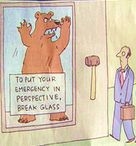What gives?
What gives?
Hey,
Some nights my AHI is like 1.8
Others its 13.8
What gives?
How do I find out why I keep waking up at night?
I dont wake up gasping for air like I used to. (Before cpap)
I just wake up.
Then I'm not tired
The second I take my mask off,
Instant tired.
Some nights my AHI is like 1.8
Others its 13.8
What gives?
How do I find out why I keep waking up at night?
I dont wake up gasping for air like I used to. (Before cpap)
I just wake up.
Then I'm not tired
The second I take my mask off,
Instant tired.
_________________
| Mask: Quattro™ FX Full Face CPAP Mask with Headgear |
| Additional Comments: 11Cm. M Series Pro C-Flex CPAP Machine. Its selected but for some reason doesnt show up on my posts. |
- Sheriff Buford
- Posts: 4111
- Joined: Mon Aug 09, 2010 8:01 am
- Location: Kingwood, Texas
Re: What gives?
The only thing I can think of is your leak rates. Does your machine record leak rates? If your leak rates coincide with the high ahi, then that's your culprit.
Sheriff
Sheriff
_________________
| Machine: AirSense 11 Autoset |
| Mask: Mirage Quattro™ Full Face CPAP Mask with Headgear |
- Sir NoddinOff
- Posts: 4189
- Joined: Mon May 14, 2012 5:30 pm
- Location: California
Re: What gives?
It seems your body is adapting to your CPAP therapy a little differently every night. That happened to me after a month on CPAP. I suggest you search this site for 'fragmented sleep'. Also, read up on Sleeyhead and ResMed sleep software and use that knowledge to pinpoint your problem. Post some of your graphs, which may give the software experts some more data to consider. Good luck.
_________________
| Mask: AirFit™ F10 Full Face Mask with Headgear |
| Additional Comments: Sleepyhead software v.0.9.8.1 Open GL and Encore Pro v2.2. |
I like my ResMed AirFit F10 FFM - reasonably low leaks for my ASV therapy. I'm currently using a PR S1 AutoSV 960P Advanced. I also keep a ResMed S9 Adapt as backup. I use a heated Hibernite hose. Still rockin' with Win 7 by using GWX to stop Win 10.
-
johnthomasmacdonald
- Posts: 977
- Joined: Sun Sep 02, 2012 1:48 pm
- Location: northwest new jersey and Boston Mass
Re: What gives?
Insylem: "Hey,
Some nights my AHI is like 1.8
Others its 13.8
What gives? "
Don't know but if you find out please tell me since i'm pretty similar. 2 nights ago I was like ahi 1.3 and last night i was 11.07. When it was 1.3 it was all centrals, at 11 it was 6 centrals and 5 of everything else - i can't see any correlation to leak rates. THe problem has gotten better with a vpap machine and i hope that over time it will go away on its own
Some nights my AHI is like 1.8
Others its 13.8
What gives? "
Don't know but if you find out please tell me since i'm pretty similar. 2 nights ago I was like ahi 1.3 and last night i was 11.07. When it was 1.3 it was all centrals, at 11 it was 6 centrals and 5 of everything else - i can't see any correlation to leak rates. THe problem has gotten better with a vpap machine and i hope that over time it will go away on its own
_________________
| Mask: Mirage Quattro™ Full Face CPAP Mask with Headgear |
| Additional Comments: Resmed ASV adapt enhanced - epap=8; minPS=3; maxPS=17 ave. pressure =10 |
Re: What gives?
Hi insylem!insylem wrote:Hey,
Some nights my AHI is like 1.8
Others its 13.8
What gives?
How do I find out why I keep waking up at night?
I dont wake up gasping for air like I used to. (Before cpap)
I just wake up.
Then I'm not tired
The second I take my mask off,
Instant tired.
We do not sleep the same any two nights. Think about what you did the previous day and start tracking what makes a good or bad night.
To find out what is happening at night rig to use the data from your cpap. If your machine is supported by SleepyHead (Google: sorceforge SleepyHead) it can help you see all your data and make sense of it.
If you cannot do that video tape or record the audio of the night. Any data is usually useful.
The breathing chemoreflexes (how your systems manages breathing to make the correct O2 and CO2 levels to respond to the current energy needs) are greatly skewed in those with OSA. To me it sounds like you may be new to treatment or are having problems with your treatment that have caused your system to run with too much CO2 when not breathing a bit more as we tend to when the CPAP constant pressure is added to the mix.
So when you take off your mask the CO2 levels go too high.
I found this went away with time after I had been on working CPAP for a time. I think aerobic and, if you are in good shape some interval training would help.
Below is how I do it. Keep in mind I am using my night to night data to detect problems with AHI or unstable breathing. It is a bit of a long read – I am working on it:
I have come to believe that the threshold at which PAP pressure will prevent apneas is constantly in motion. AHI appears to come from inflammation in the airway passage, muscle tone in there, and likely feedback from the air moving in there not getting to the brain as it should. More stress, more inflammation, more AHI for example. What you eat, drink, watch on TV (virtual violence stress) all can make changes in your AHI.
Another part of this is breathing control. The pressure from PAP tends to make inspiration easier. Our expiration muscles are used to talk and so are pretty strong. When we use PAP we tend to use greater volumes of air. More air passing through the system blows off more CO2. But we need a certain amount of CO2 in our system to maintain circulation and metabolism both of which are frustrated if it is blown off. If we are, for example, stressed with worries or fears this adds to the tendency to breath more. All this breathing tends to cause arousals which activate the central nervous system like fears do and adds yet more breathing. This can greatly affect our quality of sleep! This is often called unstable breathing.
Both AHI and the arousals from unstable breathing activate the central nervous system so each tends to cause more of the other as well as more of itself.
So my simple strategy is to find a good "sweet spot" between the level of pressure to prevent AHI and the level of pressure which would induce unstable breathing. I believe I have learned that lifestyle changes facilitate the growth of that "sweet spot" - indeed currently 8 handles my AHI and unstable breathing would likely begin at 13 for me (which will vary greatly according to the days stress level). After reading about it I am much more afraid of unstable breathing than AHI so a machine which does not automatically raise pressure makes more sense to me. As well, I think it is easer for my body to respond to a constant rather than a moving object. I simply believe that with CPAP I have the greatest chance at the highest quality of sleep.
So now, if the pressure is too low you will have events. Not good. Indeed one of the not good things is that the Central Nervous System is ratcheted up moving the threshold for unstable breathing down.
Things I have found tend to reduce my tendency toward unstable breathing:
1. Reduce Stress!!!! This is definitely the top of the list, most important thing. Stress ratchets up the central nervous system (CNS).
2. Aerobic Exercise and especially, if your doctor approves, a bit of Interval Training included. Breathing stability is all about breathing reflexes (they often call them chemoreflexes – reactions to changes in the amounts of oxygen and carbon dioxide in the blood). Place the body under load and you give them a workout. Place them under heavy load, even better. I have also noted that making close to my 10,000 steps a day at a less than aerobic pace helps with sleep in general. Also you might ask me about Pulse Oximeter Guided Breathing.
3. Staying away from violent media (TV, video games, etc...). These tend to stimulate the central nervous system like real stress (see #1).
4. Reduce simple carbs and stimulants near bed time.
5. Start CPAP use with quiet breathing always (well ok, I calm myself starting every night – it always wants to take off).
So hopefully doing the above will move the unstable breathing threshold up.
Things I have found move the Obstructive Apnea Prevention Pressure need down:
1. Reduce Stress!!! Stress tends to cause an inflammatory reaction in the body – inflamed airway tends to collapse easier.
2. Raise the head of your bed a couple of inches (I use cheap concrete bricks from a building supply store - <$5 for both). I know of at least one doctor who recommends this for pressure issues. It does seem to make things better in general I have noticed in my own data, and is known to help prevent GERD. I also kind of think that if there is more blood near the feet there is less blood filling the tissues in the airway passage so less pressure needed to push them back.
3. Eat anti-inflammatory foods. Less inflammation, less OSA.
4. Stay away from processed foods. I think just say no to GMOs. Stay away from preservatives. Take good care of your microbiome. I believe doing so will reduce inflammation so less OSA and less pressure needed to prevent OSA.
5. Take some cooking classes and start a long term relationship with a dietitian. Your body longs for good food prepared from scratch. Feed it well, it can better treat you well.
May we find increasingly better health!
Todzo
May any shills trolls sockpuppets or astroturfers at cpaptalk.com be like chaff before the wind!
Re: What gives?
Oh hey cool thanks for the tips
_________________
| Mask: Quattro™ FX Full Face CPAP Mask with Headgear |
| Additional Comments: 11Cm. M Series Pro C-Flex CPAP Machine. Its selected but for some reason doesnt show up on my posts. |
Re: What gives?
That breathing control stuff is mostly nonsense. New age voodoo.
_________________
| Mask: Swift™ FX Nasal Pillow CPAP Mask with Headgear |
| Humidifier: S9™ Series H5i™ Heated Humidifier with Climate Control |
| Additional Comments: Also SleepyHead, PRS1 Auto, Respironics Auto M series, Legacy Auto, and Legacy Plus |
Please enter your equipment in your profile so we can help you.
Click here for information on the most common alternative to CPAP.
If it's midnight and a DME tells you it's dark outside, go and check for yourself.
Useful Links.
Click here for information on the most common alternative to CPAP.
If it's midnight and a DME tells you it's dark outside, go and check for yourself.
Useful Links.
- MaxDarkside
- Posts: 1199
- Joined: Sun Dec 18, 2011 4:21 pm
- Location: Minneapolis, MN
Re: What gives?
Theory: Some element of your apnea is positional. Some nights maybe you sleep on your back more, AHI goes high. Some nights more on your side/tummy, AHI goes low. Mine bounces like this, though lower AHI's (some nights 0.3, some nights 3.5). My apnea is a large degree positional.insylem wrote:Some nights my AHI is like 1.8
Others its 13.8
What gives?
_________________
| Mask: Quattro™ FX Full Face CPAP Mask with Headgear |
| Humidifier: S9™ Series H5i™ Heated Humidifier with Climate Control |
| Additional Comments: CMS-50E Oximeter, Zeo Bedside, Software: Comm'l grade AI analytics server & tools & SleepyHead |
Do or Die... Sleep Apnea killed me, but I came back. Click for my story
Please visit my My Apnea Analytics blog. Maybe we can help each other.
54 yrs, 6' 1", 160->172 lbs
Please visit my My Apnea Analytics blog. Maybe we can help each other.
54 yrs, 6' 1", 160->172 lbs
-
ReadyforRest
- Posts: 136
- Joined: Thu Jul 26, 2012 12:43 pm
- Location: Ontario, Canada
Re: What gives?
insylem ... what Max said is very true. Many of us find that sleeping on our back causes more apneas, if our apnea is positional. I recently bought a Pappillow which has helped, and I also try to sleep on one side or the other and less on my back. I usually wake up very briefly when I'm turning over. That's when I remind myself to turn completely over onto the other side, rather than just onto my back. Since I've been doing that, my AHI has been FAR more consistent and stayed down in the 0.5 to 1.0 range most nights (once in a while 2 to 3, but rarely). Another thing that causes higher AHI's is because some people have more apneas during REM sleep. You may or may not. Your titration study would possibly give you that information. Since you have an autopap machine, you are probably taking care of that issue with the auto setting (if it's set to auto) because it adjusts the pressure higher when it senses you need it.
Try to get any leaks under control. Make sure your pressure is being monitored too, because often during the first month or two it will need slight adjustments by your sleep doc in order to give you optimal treatment. Mine did. Just a few things for you to look into. Good luck.
Try to get any leaks under control. Make sure your pressure is being monitored too, because often during the first month or two it will need slight adjustments by your sleep doc in order to give you optimal treatment. Mine did. Just a few things for you to look into. Good luck.
_________________
| Humidifier: S9™ Series H5i™ Heated Humidifier with Climate Control |
| Additional Comments: SleepyHead v0.9.1, Pressure: 9 - 14 |












